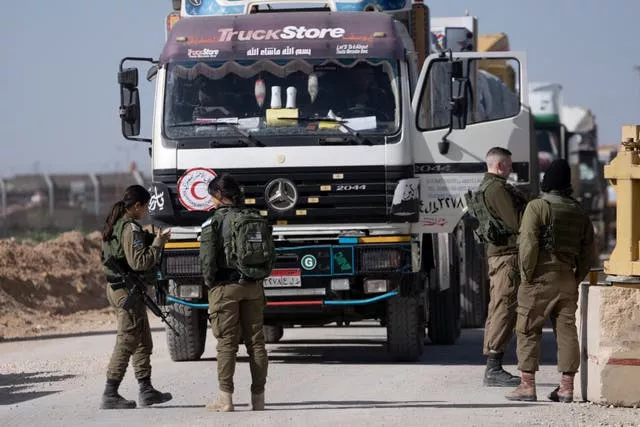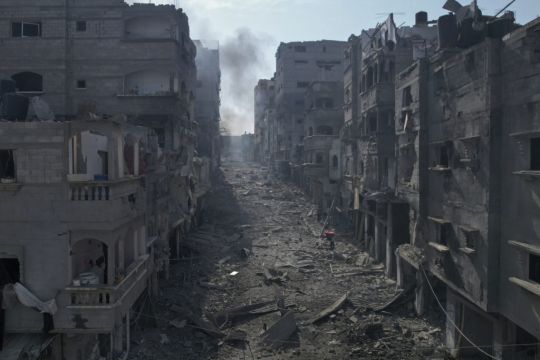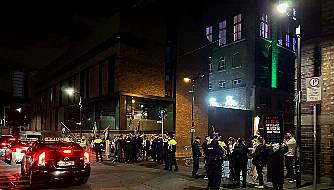Health officials in the Hamas-run Gaza Strip say more than 20,000 Palestinians have been killed in the war between Israel and Hamas.
The figure, amounting to nearly 1% of the territory’s pre-war population, is a new reflection of the staggering cost of the war, which in just over 10 weeks has displaced more than 80% of Gaza’s people and devastated wide swaths of the tiny coastal enclave.
Gaza’s health ministry said on Friday that it has documented 20,057 deaths in the fighting.
The ministry does not differentiate between combatant and civilian deaths.
It has previously said that roughly two-thirds of the dead were women or minors. It said 53,320 Palestinians have been wounded.
Meanwhile, two senior European Union officials said they are “deeply shocked” after an assessment that the entire population of Gaza is at risk of acute food insecurity because of the Israeli offensive.

EU foreign policy chief Josep Borrell and crisis management commissioner Janez Lenarcic said in a statement: “This is a grave development and should be a wake-up call for the whole world to act now to prevent a deadly human catastrophe.
“We urgently need continued, rapid, safe and unhindered humanitarian access to avoid a further worsening of an already catastrophic situation,” they said. “The lack of access to basic staples is creating a situation of famine.”
Israel declared war after Hamas militants stormed across its border on October 7 and killed some 1,200 people and kidnapped 240 others.

Israel has carried out thousands of air strikes as well as a fierce ground offensive in what it says is a campaign to destroy Hamas’ military capabilities.
It blames Hamas for the high civilian death toll, citing the group’s use of crowded residential areas for military purposes.
Israeli officials say the army has killed some 7,000 Hamas militants, but it has not presented any evidence to back up the claim.
This announcement about the risk of famine in Gaza is sobering but not surprising.
We have been warning for weeks that, with such deprivation and destruction, each day that goes by will only bring more hunger, disease and despair to the people of Gaza.
The war must end. https://t.co/YqIeqoAR08— Martin Griffiths (@UNReliefChief) December 22, 2023
More than half a million people in Gaza – a quarter of the population – are starving, according to a report from the United Nations and other agencies.
Despite the emergency, a UN Security Council vote on aid deliveries and terms for a ceasefire was delayed again on Thursday, after days of high-level negotiations.
The United States, which has veto power, has pushed back against calls for an immediate ceasefire and giving the UN sole responsibility for inspecting aid deliveries.
Israel, citing security grounds, insists it needs to be able to screen goods entering Gaza.

The US said it would back a revised resolution that calls for “creating the conditions” for a ceasefire, rather than an immediate end to fighting. Other countries support a stronger text and said diplomats would need to consult their governments before a vote, which is expected later on Friday.
Martin Griffiths, the UN’s humanitarian affairs chief, lamented the world’s inaction.
He wrote on X: “That such a brutal conflict has been allowed to continue and for this long – despite the widespread condemnation, the physical and mental toll and the massive destruction – is an indelible stain on our collective conscience.”
Israel, shielded by the US, has resisted international pressure to scale back its offensive and has said it would press on until Hamas, the militant group that has ruled Gaza for 16 years, has been destroyed.

The military has said that months of fighting lie ahead in southern Gaza, an area packed with the vast majority of the enclave’s 2.3 million people, many of whom were ordered to flee combat in the north in earlier stages of the war.
Since then, evacuation orders have pushed displaced civilians into ever-smaller areas of the south as troops focus on the city of Khan Younis, Gaza’s second-largest. The military said on Thursday that it is sending more ground forces, including combat engineers, to Khan Younis to target Hamas militants above ground and in tunnels.
On Friday, the military ordered tens of thousands of residents to leave their homes in Burej, an urban refugee camp, and surrounding communities, within the territory that Israel originally told people to flee to.
The air and ground campaign also continued in the north, even as Israel says it is in the final stages of clearing out Hamas militants there.

In the city of Rafah, on the border with Egypt, an air strike on a house killed six people, including an infant, according to Associated Press journalists who saw the bodies at a hospital.
Rafah is one of the few places in Gaza not under evacuation orders, but has been targeted in Israeli strikes almost every day.
Israel blames Hamas for the high civilian death toll during its intense air and ground campaign, citing the group’s use of crowded residential areas for military purposes.
The UK is stepping up our humanitarian aid commitments to Gaza, getting life-saving supplies to people in desperate need.@David_Cameron saw first-hand the impact UK aid is having on a visit to Al Arish near the Egypt-Gaza border.
Read more: https://t.co/L27zRHgcxJ pic.twitter.com/rWioAxGLvO— Foreign, Commonwealth & Development Office (@FCDOGovUK) December 21, 2023
Israel declared war after Hamas militants stormed across its border and killed some 1,200 people and kidnapped 240 others.
Israel’s military says 139 of its soldiers have been killed in the ground offensive. It says it has killed thousands of Hamas militants, including about 2,000 in the past three weeks, but it has not presented any evidence to back up the claim.
Meanwhile, phone and internet services were gradually being restored late, after the latest communications blackout of 35 hours.
Repeated cuts in communications have hampered aid deliveries at a time of unprecedented humanitarian needs in Gaza.







